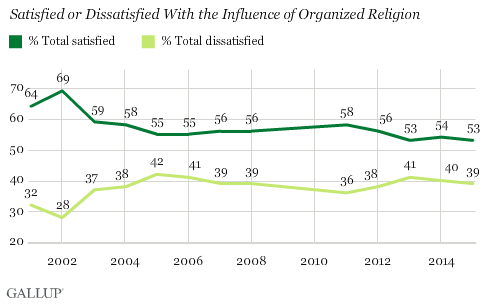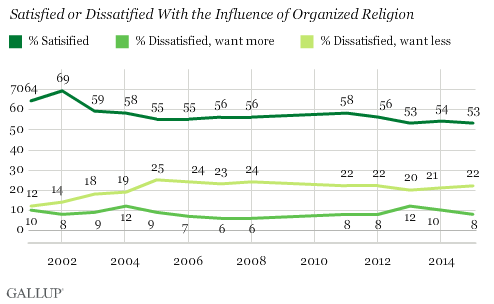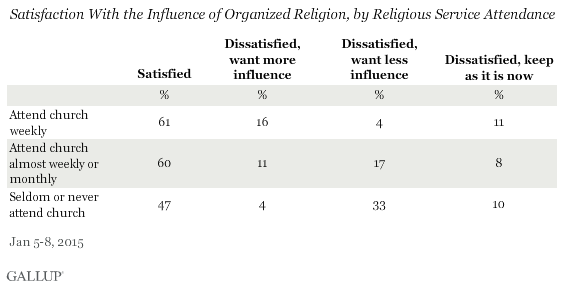Story Highlights
- Overall, 53% satisfied with influence of organized religion
- Majority of dissatisfied want religion to have less influence
PRINCETON, N.J. -- A slight majority of Americans, 53%, are satisfied with the influence of organized religion in the U.S. This level of satisfaction has changed little over the past three years, but remains down from what Gallup has measured previously -- including higher levels measured in 2001 to 2004 -- suggesting that Americans' satisfaction with organized religion has settled in at a new baseline.

The latest measurement comes from Gallup's annual Mood of the Nation survey, conducted Jan. 5-8. Satisfaction with the influence of religion comes in sixth on the list of 27 aspects of American life that Gallup measures in the survey.
Nearly two in three Americans (64%) were satisfied with the influence of religion when they were first asked this question in this format in January 2001, exactly eight months before the 9/11 terrorist attacks. Satisfaction rose to its high point of 69% a year later, then dropped below 60% in the years thereafter. Although Americans' satisfaction has fluctuated some from year to year, the basic pattern has been generally stable since 2005, with slightly lower levels of satisfaction recorded over the past three years.
Most of Those Dissatisfied Want Less Influence of Organized Religion
Americans who report being dissatisfied with the influence of religion were asked if they would like to see organized religion have more influence, less influence or keep its influence as it is now. Most of this dissatisfied group, equating to 22% of all Americans, say they would prefer less influence, while 8% would like to see organized religion have more influence.
Over time, the group of Americans who are dissatisfied and want religion to have less influence has consistently been larger than the group who are dissatisfied and want it to have more influence. The gap between these groups grew bigger as overall satisfaction with the influence of organized religion dropped in 2005. There has been little meaningful change in these trend lines in more recent years.

The pattern of responses to this expanded question about the influence of religion varies in expected ways across segments of the population defined by their religious service attendance. Satisfaction is at 61% among those who attend religious services weekly -- and drops to 47% among those who seldom or never attend.
Most of those who seldom or never attend church and who are dissatisfied want organized religion to have less influence. Those who attend church weekly and are dissatisfied lean toward wanting religion to have more influence. On the whole, however, non-churchgoers are twice as likely to be dissatisfied and to want to see religion have less influence than weekly churchgoers are to be dissatisfied because they want it to have more influence, 33% vs. 16%.

More generally, these data show that 77% of the most religious Americans are either OK with the current influence of organized religion or are dissatisfied and would like it to have more influence. The percentage of Americans who are in this group drops among the least religious Americans, but still is a majority, at 51%.
Implications
It is clear that Americans' satisfaction with the role of organized religion in society is down from where it was a decade ago. There have been changes in other measures of religiosity over this time period -- including most relevantly, a gradual increase in the percentage of Americans who say they have no formal religious identity. This suggests that the drop in satisfaction with the role of organized religion is at least to some degree, a manifestation of more general societal and cultural trends relating to religion.
The drop in satisfaction with organized religion does appear to have leveled off in recent years, although as is the case with many attitudinal trends, it is difficult to predict what might happen in the years ahead. It is also important to remember that this question deals with the influence of organized religion. Responses to this question could reflect more of a shift in the way that Americans are conducting the spiritual side of their lives, rather than a definitive shift toward a more secular society. This interpretation is supported by other trends showing that Americans have become more likely to affiliate with non-denominational churches and to eschew identification with formal religions.
Overall, despite changes over time, the majority of Americans today continue to be a member of a church, to attend religious services at least somewhat regularly and to have positive views about the influence of organized religion, while a minority are not at all involved with organized religion and would like to see its influence lessened.
Survey Methods
Results for this Gallup poll are based on telephone interviews conducted Jan. 5-8, 2015, with a random sample of 804 adults, aged 18 and older, living in all 50 U.S. states and the District of Columbia. For results based on the total sample of national adults, the margin of sampling error is ±4 percentage points at the 95% confidence level. All reported margins of sampling error include computed design effects for weighting.
Each sample of national adults includes a minimum quota of 50% cellphone respondents and 50% landline respondents, with additional minimum quotas by time zone within region. Landline and cellular telephone numbers are selected using random-digit-dial methods.
Learn more about how Gallup Poll Social Series works.

